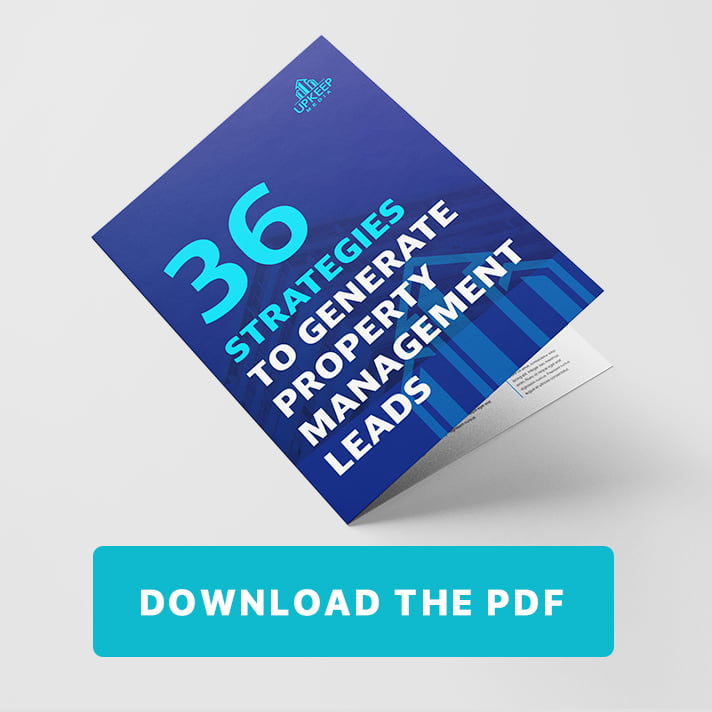It’s all too easy to get bogged down by the day-to-day task of maintaining a property management business. You need to keep honing and updating your property manager skills to succeed.
In this article, we reveal 27 habits of highly successful property managers. The habits will help you:
- Improve your approach to technology, reporting and communication
- Create a killer playbook to grow your client base
- Stay organized and check tasks off your To-Do list one by one
1. Make communication a core competency

The first step is to create templates for everything. Templates streamline the communication process by reducing the need to redo the same thing over and over again.
For example, use your property management website to post templates. You can upload maintenance request forms, so tenants can download and submit forms whenever they have any request.
2. Successful property managers do not procrastinate
Successful property managers get things done, when they need to be done. At the same time, they’re savvy and experienced enough to know which parts of their job take priority over others. If you’re going into the industry, it’s important to have good work habits.
3. Get up to speed and stay current on all things related to property management
Stay updated on things like changes in rules and regulations, local rent rates and other emerging trends related to real estate. Property owners want to be assured that the manager they’re dealing with knows what they’re talking about, so always be learning.
4. Positive attitude

Considering what you’ll be dealing with on a daily basis, you need to maintain a positive, can-do attitude at all times. Not only will you be facing the inevitable landlord-tenant disputes, but you’ll also need to stay calm when the market isn’t going the way you want it to.
5. Develop a system to find the right tenant
To avoid any landlord-tenant issues, you need to have a system for screening and finding quality tenants. The system should help you automate processes like background checks, security deposits and related paperwork.
Of course, you don’t want to take out the human element altogether. Once the preliminary screening process is done, have the landlord help you conduct the final vetting of tenants.
6. Be a forward thinker

Thanks to technology, the property management industry is evolving quickly. More and more software, mobile, and cloud solutions are being designed to make property management processes easier and more efficient. To keep up, you need to adapt to and embrace these changes.
7. Have a long-term strategy and set goals
You’d be surprised at the number of property managers who don’t do this. Having a long-term strategy and setting goals makes you thoroughly focused and motivated.
Here are some questions you need to ask before setting a long-term strategy.
- How has your property management business performed in terms of tenant retention?
- Are there procedures that can be improved to better serve property owners and your tenants?
- What can be done to lessen expenditures?
- Are your tenants and property owners satisfied with the service you’re offering?
- How efficient are you at collecting rents, deposits and the like?
- Are you consistently acquiring new clients?
8. Be decisive
Some people make decisions on gut feel. Others make them intuitively. And still others do a combination of both.
However you make a decision, stand by it. Any consequences should be dealt with ASAP.
9. Successful property managers are curious
One habit of successful property managers is curiosity. They are always on the lookout for better and more innovative ways to accomplish their goals.
10. Engage your residents

A successful property manager knows that forging genuine connections with their clients is crucial.
Get to know your residents personally. Take the time to engage the people living in the properties you manage. You might be surprised at what you’ll get from a quick chitchat.
Other ways property managers can improve resident engagement are:
- Implement engagement strategy basics.
- Aim for transparency.
- Align contact center objectives and business goals.
- Train your staff to provide consistent, high-quality service.
11. Create a Playbook for Growth
Great property managers are always on the lookout for growth opportunities. These opportunities involve taking advantage of every possible avenue to market your business.
The first step to kick-starting your company growth is scouring local real estate groups, property management networks and other places where you can do online marketing.
12. Present a well prepared, clean and tidy property

As the saying goes, first impressions last. How you present your company on your website can make the difference between a client who says “Yes” and one who says “I’ll pass.”
Before your client moves in, do a proper inspection of the rental property. A pre-tenancy report allows you to identify any issues beforehand.
13. Be self-driven
Successful property managers have a strong desire to achieve success. They avoid distractions, and mostly concern themselves with growing and improving as professionals. They go above and beyond to make sure they achieve their objectives.
As a property manager, you should:
- Dedicate yourself to discovering innovative solutions.
- Join associations.
- Conduct research.
- Attend seminars.
14. Complete quarterly inspections
Property managers conduct thorough and regular inspections of the properties they handle. Failure to do so can not only void insurance coverage, but also lead to unhappy clients.
Other reasons to conduct regular inspections of rental properties are:
- Preserving and increasing the value of the property
- Identifying areas that need repairs and maintenance
- Confirming that no illegal activity is taking place on the premises
- Increasing tenant retention
Ideally, inspections should be logged and completed every three months. It’s also a good idea to hire a professional inspector.
15. Get your paperwork in order

As a property manager, you have to deal with paperwork on a daily basis, and keep up with the latest industry trends at the same time.
Luckily, if you have a good file management system in place, you can save time and better handle the likes of legal disputes, audits and Fair Housing claims.
For example, you’ll be handling tenant files like:
- Property maintenance notices
- Rent payment records
- Move-in and move out inspection paperwork
- Security deposits and security deposit refunds
- Correspondence regarding approval
- Eviction paperwork
- Lease violations and corresponding action records
16. Find opportunities where others see obstacles
One secret of success is being able to solve problems others can’t. This is especially true in property management. It’s important to have a proactive attitude at all times.
For example, you can attract more owners by showing the benefits of property management versus self-managed properties. You can sweeten the deal with incentives, discounts and referral fees.
17. Learn, from mistakes, colleagues and your network
Being a successful property manager requires you to be knowledgeable about a lot of things. You don’t have to be an expert in every field, but you should have a basic understanding of the essentials.
For example, it’s not enough to know how to manage a property. You should also have a working knowledge of online marketing, accounting and other fields related to real estate. The more well-rounded you are, the more marketable you can be, and the better you’ll be at what you do.
18. Be organized

With good organizational skills, you can handle anything thrown your way. Luckily, the latest technology makes it easier to keep things in order.
According to a survey conducted by Buildium, 81% of property owners said property managers ought to use technology. With technology, property managers can do things like find good tenants, keep up with maintenance issues and track landlord-tenant disputes.
Here are organizational and planning tips for property management professionals.
- Create a communications protocol with the property owner.
- Know which tasks you should outsource, and which ones shouldn’t.
- Always have a contingency plan.
- Minimize paperwork as much as you can.
19. Have clearly defined expectations
All property managers want to have a good relationship with their tenant. To ensure this, you have to establish boundaries with tenants. Being too strict can create tension, while being too casual might be taken the wrong way.
20. Managing your time is key

With clients and other issues to deal with, managing your time is important. When you know how to use (and not use) your time, you become more productive and efficient.
To manage your time, create a routine and stick to it. Make a large, visual to-do list and ready your workstation for the next day.
But avoid the temptation to be stuck to your desk answering emails 24/7. Instead, break up your day into chunks devoted to a single task at a time.
21. Successful investors act with integrity
Acting with integrity will build you a positive reputation in the industry. Integrity essentially means that what you do matches what you say.
Always remember that your company’s name is on the line. A good reputation is a recipe for more business.
22. Be proactive
When you’re always one step ahead, you’re more likely to avoid problems.
Send out surveys. Enable recurring payments. Send out reminders to tenants five days before their rent is due. Require renters insurance. Anticipate problems before they come.
23. Be confident
Becoming a successful property manager requires hard work. It takes a lot of time to master the craft. But once you’ve become a trusted expert in your industry, you have every right to feel proud of yourself.
24. Avoid falling into the complacency trap

The property management industry changes every single day. You need to keep up with the latest trends lest you fall into the complacency trap. Doing this will make better equipped to handle any eventuality.
25. Be dependable and available
Being available when clients need you is vital. Your job description requires you to work with different kinds of people, and it’s your job to keep them satisfied.
Respond to emails and phone calls in a timely manner. If you can’t respond immediately, let them know and offer your sincerest apologies. Either way, show them that you genuinely care about resolving their issue as soon as possible.
Property management is a fast-paced and highly competitive niche. As such, it’s important to have skills and abilities that keep you ahead of the pack. Along with self-discipline and determination, these habits will improve both your professional and personal life.



